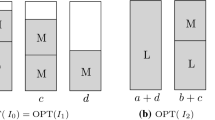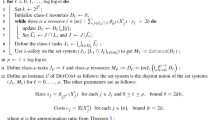Abstract
We consider a stochastic variant of the packing-type integer linear programming problem, which contains random variables in the objective vector. We are allowed to reveal each entry of the objective vector by conducting a query, and the task is to find a good solution by conducting a small number of queries. We propose a general framework of adaptive and non-adaptive algorithms for this problem, and provide a unified methodology for analyzing the performance of those algorithms. We also demonstrate our framework by applying it to a variety of stochastic combinatorial optimization problems such as matching, matroid, and stable set problems.
Similar content being viewed by others
Notes
Algorithms 1 and 2 have freedom of the choices of algorithms for solving LPs and for finding an integral solution in the last step; in particular, the latter depends heavily on each specific problem before formulated as an integer LP. For this reason, we use the term “strategy” rather than “algorithm” to refer them.
Here we consider two types of randomness together. One is on the realization of \({\tilde{c}}_j\), which is contained in the “stochastic” input and determines the omniscient optimal value \({\tilde{\mu }}\). The other is on the choice of queried elements, which is involved in our “randomized” algorithms and affects the pessimistic LP obtained after the iterations.
The first two are assumed without loss of generality (by removing the corresponding constraints and variables if violated). The third one is for simplicity, which holds for most of applications. The generalizability to remove it is discussed in Sect. 4.1.4 with a specific application.
Note that, if the optimal solution x is written as a convex combination \(\sum _{i} \lambda _i x^{(i)}\) of basic feasible solutions \(x^{(i)}\), then every \(x^{(i)}\) is also optimal and one can replace x with any \(x^{(i)}\). In particular, when the considered polyhedron is integral (i.e., every extreme point is an integral vector), Algorithms 1 and 2 can be derandomized based on this observation.
Precisely, the discussion is given via a reduction to the matroid matching problem, which preserves the variables and the feasible region.
A graph is strongly t-perfect if the system in (4.32) is TDI. Any strongly t-perfect graph is t-perfect, but the converse is open.
References
Adamczyk, M.: Improved analysis of the greedy algorithm for stochastic matching. Inf. Process. Lett. 111(15), 731–737 (2011)
Adamczyk, M., Sviridenko, M., Ward, J.: Submodular stochastic probing on matroids. Math. Oper. Res. 41(3), 1022–1038 (2016)
Assadi, S., Khanna, S., Li, Y.: The stochastic matching problem with (very) few queries. In: Proceedings of the 17th ACM Conference on Economics and Computation, pp. 43–60. ACM (2016)
Assadi, S., Khanna, S., Li, Y.: The stochastic matching problem: beating half with a non-adaptive algorithm. In: Proceedings of the 18th ACM Conference on Economics and Computation, pp. 99–116. ACM (2017)
Bansal, N., Gupta, A., Li, J., Mestre, J., Nagarajan, V., Rudra, A.: When LP is the cure for your matching woes: improved bounds for stochastic matchings. Algorithmica 63(4), 733–762 (2012)
Behnezhad, S., Reyhani, N.: Almost optimal stochastic weighted matching with few queries In: Proceedings of the 19th ACM Conference on Economics and Computation, pp. 235–249. ACM (2018)
Blum, A., Dickerson, J.P., Haghtalab, N., Procaccia, A.D., Sandholm, T., Sharma, A.: Ignorance is almost bliss: near-optimal stochastic matching with few queries. In: Proceedings of the 16th ACM Conference on Economics and Computation, pp. 325–342. ACM (2015)
Blum, A., Gupta, A., Procaccia, A., Sharma, A.: Harnessing the power of two crossmatches. In: Proceedings of the 14th ACM conference on Electronic Commerce, pp. 123–140. ACM (2013)
Chan, Y.H., Lau, L.C.: On linear and semidefinite programming relaxations for hypergraph matching. In: Proceedings of the 21st Annual ACM-SIAM Symposium on Discrete Algorithms, pp. 1500–1511. SIAM (2010)
Chen, N., Immorlica, N., Karlin, A.R., Mahdian, M., Rudra, A.: Approximating matches made in heaven. In: Proceedings of the 36th International Colloquium on Automata, Languages, and Programming, pp. 266–278. Springer (2009)
Chitnis, R., Cormode, G., Esfandiari, H., Hajiaghayi, M., McGregor, A., Monemizadeh, M., Vorotnikova, S.: Kernelization via sampling with applications to finding matchings and related problems in dynamic graph streams. In: Proceedings of the 27th Annual ACM-SIAM Symposium on Discrete Algorithms, pp. 1326–1344. SIAM (2016)
Costello, K., Tetali, P., Tripathi, P.: Stochastic matching with commitment. In: Proceedings of the 39th International Colloquium on Automata, Languages and Programming, pp. 822–833. Springer (2012)
Cunningham, W.H., Marsh, A.B.: A primal algorithm for optimum matching. Polyhedral Combinatorics pp. 50–72 (1978)
Dean, B.C., Goemans, M.X., Vondrák, J.: Approximating the stochastic knapsack problem: the benefit of adaptivity. In: Proceedings of the 45th Annual IEEE Symposium on Foundations of Computer Science, pp. 208–217. IEEE (2004)
Dean, B.C., Goemans, M.X., Vondrák, J.: Adaptivity and approximation for stochastic packing problems. In: Proceedings of the 16th Annual ACM-SIAM Symposium on Discrete Algorithms, pp. 395–404. SIAM (2005)
Dickerson, J.P., Sandholm, T.: Organ exchanges: a success story of AI in healthcare. In: 30th Conference on Artificial Intelligence Tutorial Forum (2016)
Downey, R.G., Fellows, M.R.: Parameterized Complexity. Springer, Berlin (2012)
Edmonds, J.: Submodular functions, matroids, and certain polyhedra. In: Proceedings of the Calgary International Conference on Combinatorial Structures and Their Applications, pp. 69–87. Gordon and Breach (1970)
Egerváry, E.: On combinatorial properties of matrices. Matematikai Lapok 38, 16–28 (1931)
Gijswijt, D., Pap, G.: An algorithm for weighted fractional matroid matching. J. Comb. Theory, Ser. B 103(4), 509–520 (2013)
Gupta, A., Nagarajan, V.: A stochastic probing problem with applications. In: Proceedings of the 16th International Conference on Integer Programming and Combinatorial Optimization, pp. 205–216. Springer (2013)
Gupta, A., Nagarajan, V., Singla, S.: Adaptivity gaps for stochastic probing: submodular and XOS functions. In: Proceedings of the 28th Annual ACM-SIAM Symposium on Discrete Algorithms, pp. 1688–1702. SIAM (2017)
Hurkens, C.A.J., Schrijver, A.: On the size of systems of sets every \(t\) of which have an SDR, with an application to the worst-case ratio of heuristics for packing problems. SIAM J. Discret. Math. 2(1), 68–72 (1989)
Király, T., Lau, L.C., Singh, M.: Degree bounded matroids and submodular flows. Combinatorica 32(6), 703–720 (2012)
Kolliopoulos, S.G., Young, N.E.: Approximation algorithms for covering/packing integer programs. J. Comput. Syst. Sci. 71(4), 495–505 (2005)
Kőnig, D.: Graphs and matrices. Math. Fiz. Lapok 38, 116–119 (1931)
Lee, J., Sviridenko, M., Vondrák, J.: Matroid matching: the power of local search. SIAM J. Comput. 42(1), 357–379 (2013)
Molinaro, M., Ravi, R.: The query-commit problem. arXiv preprint arXiv:1110.0990 (2011)
Panconesi, A., Srinivasan, A.: Randomized distributed edge coloring via an extension of the Chernoff-Hoeffding bounds. SIAM J. Comput. 26(2), 350–368 (1997)
Parekh, O.: Iterative packing for demand and hypergraph matching. In: Proceedings of the 15th International Conference on Integer Programming and Combinatorial Optimization, pp. 349–361. Springer (2011)
Parekh, O., Pritchard, D.: Generalized hypergraph matching via iterated packing and local ratio. In: Proceedings of the 12th International Workshop on Approximation and Online Algorithms, pp. 207–223. Springer (2014)
Raghavan, P., Tompson, C.D.: Randomized rounding: a technique for provably good algorithms and algorithmic proofs. Combinatorica 7(4), 365–374 (1987)
Roth, A.E., Sönmez, T., Ünver, M.U.: Kidney exchange. Q. J. Econ. 119(2), 457–488 (2004)
Schrijver, A.: Combinatorial Optimization: Polyhedra and Efficiency, Springer (2003)
Shepherd, F.B., Vetta, A.: The demand-matching problem. Math. Oper. Res. 32(3), 563–578 (2007)
Turán, P.: On the theory of graphs. Colloquium Mathematicae 3(1), 19–30 (1954)
Acknowledgements
The authors thank anonymous reviewers for their careful reading and a number of valuable comments. This work was supported by JSPS KAKENHI Grant Numbers 16H06931 and 16K16011.
Author information
Authors and Affiliations
Corresponding author
Additional information
Publisher's Note
Springer Nature remains neutral with regard to jurisdictional claims in published maps and institutional affiliations.
A preliminary version of this paper appeared in SODA 2018.
Rights and permissions
About this article
Cite this article
Maehara, T., Yamaguchi, Y. Stochastic packing integer programs with few queries. Math. Program. 182, 141–174 (2020). https://doi.org/10.1007/s10107-019-01388-x
Received:
Accepted:
Published:
Issue Date:
DOI: https://doi.org/10.1007/s10107-019-01388-x
Keywords
- Stochastic problems with queries
- Packing problems
- Linear programming (LP)
- LP duality
- Approximation algorithms




